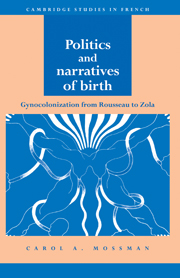Book contents
- Frontmatter
- Contents
- Acknowledgements
- A note on translations
- Introduction: conception of this book
- Cycle 1 Stendhal: delivering a plot
- Cycle 2 Production, reproductions, and narrative form: Adolphe
- Cycle 3 Gynocolonization: Rousseau, Michelet, Zola and the nineteenth-century French novel
- Conclusion
- Notes
- Bibliography
- Index
- CAMBRIDGE STUDIES IN FRENCH
- Frontmatter
- Contents
- Acknowledgements
- A note on translations
- Introduction: conception of this book
- Cycle 1 Stendhal: delivering a plot
- Cycle 2 Production, reproductions, and narrative form: Adolphe
- Cycle 3 Gynocolonization: Rousseau, Michelet, Zola and the nineteenth-century French novel
- Conclusion
- Notes
- Bibliography
- Index
- CAMBRIDGE STUDIES IN FRENCH
Summary
Given the conditions governing its conception, the birth of the republican body politic is destined to be an operation fraught with complications which no amount of ideological obstetrics is capable of resolving. If the tensions and strains manifest themselves in slightly different ways in the major authors discussed here, the underlying eviction of the maternal is the common ground of their political constructions. What is curious, it seems to me, is that no account is ever given of the fate of the dislodged body, be that woman or her African effigy. To do so would no doubt be to expose the patriarchal ideological support and power base.
And yet mater can neither be created (although nineteenth-century French patriarchy will try mightily) nor, I think, destroyed. Rousseau's incorporation, Michelet's incubus-like possession, Zola's military occupation, all involve the displacement of a significant entity. Viewed from the perspective of a topology of displacement, it is not surprising that the mother should often be represented as other-worldly in nineteenth-century French prose for, indeed, she is carnally annexed by alien forces. Sprengnether's demonstration of how the maternal haunts Freud's pages as a lingering and “spectral” presence which refuses to go away, might be recast in more historico-political terms with Freud's work itself reframed and reconsidered as a continuation of a tradition of gynocolonization.
Indeed, in The Sexual Contract, Pateman does treat Freud's Totem and Taboo as a variant of the contract story, which it most certainly is.
- Type
- Chapter
- Information
- Politics and Narratives of BirthGynocolonization from Rousseau to Zola, pp. 225 - 227Publisher: Cambridge University PressPrint publication year: 1993



